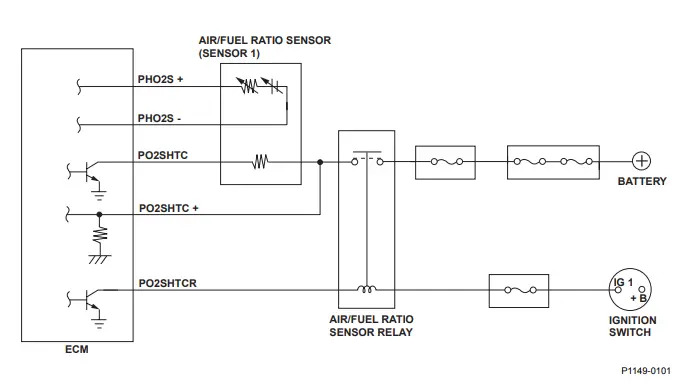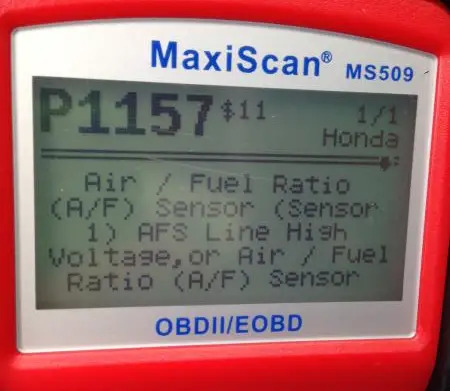P1157 Honda: Troubleshooting Air/Fuel Sensor Issues
If you’ve come across the P1157 Honda diagnostic trouble code, you’re not alone. This perplexing code has left many Honda owners searching for answers.
In this guide, we’ll explore the meaning, severity, symptoms, causes, and diagnosis of P1157 Honda. With our expertise in Honda vehicles, we’ll help you navigate through this challenge and find effective fixes.
So, let’s get started!
P1157 Honda Code: Quick Summary
Here’s a brief overview of the essential details regarding the P1157 Honda code:
- Definition: Air/Fuel Ratio (A/F) Sensor (Sensor 1) Circuit High Voltage
- Severity: Medium
- DIY Skill Level: Intermediate
- Continue To Drive?: Yes (Short-term)
- Estimated Repair Cost: $50-$200
Understanding The P1157 Code In Your Honda
The P1157 code is a common issue reported by owners of Honda vehicles, particularly the Accord, CRV, Element, and Civic models. This code indicates a potential problem with the A/F (Air/Fuel) sensor, specifically Sensor 1.
The A/F sensor plays a crucial role in measuring the oxygen content in the exhaust gas. It consists of a sensor element with an embedded heater. When activated, the heater warms up the sensor to enhance the detection of oxygen content, allowing for precise measurement. The current flowing through the heater is proportional to the oxygen content, which helps determine the air/fuel ratio.

In normal operation, the engine control module (ECM) compares the detected air/fuel ratio with the target air/fuel ratio. Based on this comparison, the ECM adjusts the fuel injection duration to maintain optimal combustion efficiency.
If the A/F sensor (Sensor 1) voltage is low, indicating a lean air/fuel ratio, the ECM issues a Rich command to increase the fuel mixture. Conversely, if the A/F sensor (Sensor 1) voltage is high, indicating a rich air/fuel ratio, the ECM issues a Lean command to reduce the fuel mixture.
The triggering of the P1157 Honda code occurs when the A/F sensor (Sensor 1) fails to activate its heater within a set time period while drawing power. The ECM detects this malfunction and stores the Diagnostic Trouble Code (DTC) P1157.
Read more: Honda OBD 2 Codes List [Generic + Manufacturer-specific]
How Serious Is The P1157 Honda?
When it comes to the severity of the P1157 Honda code, it is considered a moderate-level issue. While it may not pose an immediate threat to the safety or functionality of your Honda vehicle, it should still be addressed promptly.
In most cases, it is generally safe to continue driving your vehicle when you encounter the P1157 Honda code. However, it is important to address this code as soon as possible to prevent any potential issues with fuel combustion, fuel efficiency, or engine performance.

(Image credit: Drive Accord Forum)
To ensure your vehicle’s longevity and optimal functioning, it is advisable to have the underlying cause of the P1157 Honda code diagnosed and resolved promptly. By doing so, you can restore the proper operation of the A/F sensor system and maintain optimal fuel efficiency and engine performance.
Read more: P1009 Honda Code: VTC System Troubleshooting And Solutions
Common Signs Of P1157 Honda To Watch For
The P1157 Honda code typically presents with the following symptoms:
- Check Engine Light (CEL) illuminated
- Decreased fuel efficiency
- Engine runs rough or misfires
- Poor acceleration or lack of power
- Increased exhaust emissions
P1157 Honda Causes: What’s Behind The Code
Here are some common causes of the P1157 Honda code:
- Wiring damage or break in the A/F sensor (Sensor 1) circuit
- Faulty A/F sensor (Sensor 1)
- Defective ECM (connection issues or internal fault) – rarely
Diagnosis And Repair For P1157 Honda
In this section, we’ll provide you with a comprehensive guide to diagnose and repair the P1157 Honda code. We’ll cover the essential tools and parts required, a step-by-step procedure with helpful tips, as well as the level of DIY repair and estimated costs associated with resolving this code.
However, it’s important to note that if you’re unsure or uncomfortable with the repair process, it’s always advisable to seek assistance from a professional mechanic.
Essential Tools And Parts
To diagnose and repair the P1148 code, you may require the following tools and parts:
- OBD-II scanner
- Multimeter
- A/F sensor (Sensor 1) replacement (California-emission compliant)
- Wiring repair kit (if necessary)
- Socket set and wrenches
Step-by-Step Guide
- Connect the OBD-II scanner to retrieve the P1157 Honda code and any additional codes.
- Inspect the A/F sensor wires, wiring, and connectors for any visible damage, such as frayed wires or loose connections. Repair or replace the damaged wiring using a wiring repair kit.
- Use a multimeter to test the voltage and resistance of the A/F sensor and its heater circuit. Compare the readings to the manufacturer’s specifications.
- If the readings are abnormal and the wiring has been addressed, replace the A/F sensor (Sensor 1) with a compatible replacement part. Ensure that it meets the necessary specifications for your vehicle, especially if it requires California-emission compliance.
- Inspect the ECM connections for any loose, corroded, or damaged pins. Ensure that the ECM is properly connected. Address any connection issues detected by cleaning the connections, repairing any damaged pins, or replacing the connector if necessary.
- If the problem still persists, consider the possibility of an ECM internal fault. In this case, perform the following steps:
- Perform an ECM idle learn procedure as the vehicle’s service manual recommends.
- Check if the ECM has the latest software version. If not, update the ECM with the latest software available.
- If updating the ECM software doesn’t resolve the issue, you may need to substitute the ECM with a known-good ECM for testing purposes.
- Clear the codes using the OBD-II scanner and test-drive the vehicle to verify if the issue is resolved.
Notes:
- If your car has California emissions, use the California version of the sensor. The PCM is programmed to read the California-emission sensor specifically. The labor required for sensor replacement should be the same.
- Always use OEM sensors on Honda vehicles, as non-OEM sensors may not work properly with the ECM, even if they are functioning correctly.
- The exact location of the A/F sensor (Sensor 1) in a Honda vehicle can vary depending on the specific model and engine configuration. However, as a general guideline, it is typically located in the exhaust pipe near the bend from the engine to the catalytic converter.
DIY Repair Level And Estimated Costs
The repair procedure for the P1157 Honda code falls under an intermediate DIY level. While enthusiasts with moderate mechanical skills can tackle it, exercising caution and following the steps precisely is important. For those who prefer professional assistance, don’t hesitate to consult a skilled mechanic.
Let’s review the diagnostic and repair tasks involved in addressing the P1157 Honda code. Here’s a breakdown:
| Repair Tasks | Estimated Costs |
| Wiring repair | $20 – $50 |
| A/F sensor replacement | $100 – $200 (parts and labor) |
| ECM update | $50 – $150 |
| ECM replacement | $500 – 1,000 (parts and labor) |
Remember, these are general estimates, and actual costs may differ. It’s advisable to consult local professionals and parts suppliers for the most accurate pricing information in your specific area.
P1157 Honda Infographic

Wrapping Up
Before we wrap up, let’s ensure your Honda runs smoothly with the P1157 code addressed.
If you have any more questions or need further assistance, feel free to ask.
Remember, you don’t have to tackle it alone – professional mechanics are always there to lend a hand.
Stay safe on the road and enjoy your Honda’s optimal performance!
Reference Sources
- Gershon (uCoz), Service Bulletin 03-020.
- Drive Accord Honda Forum, P1157 – New o2 sensor didn’t fix it.
- CR-V Owners Club Forum, P1157 Cannot resolve.
- Honda Accord Forum, P1157 code 2003 Accord LX.
